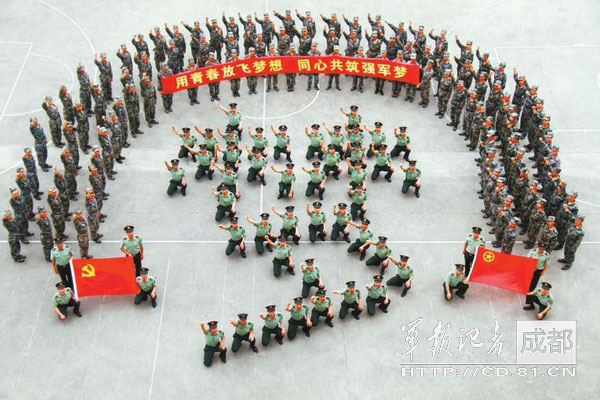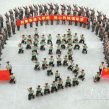
Army Day Coverage Stresses Winning Battles with “Dream of a Strong Military”
Publication: China Brief Volume: 13 Issue: 17
By:

Every August 1, like clockwork, China’s official media publishes editorials commemorating “Army Day,” the anniversary of the founding of the Chinese military, the People’s Liberation Army (PLA). This Army Day was no exception, as the media carried editorials celebrating the 86th anniversary of the PLA. Like every year, the editorials contained ubiquitous congratulatory remarks to the members of the PLA from all of China.
Besides profuse remarks praising the military, each year the editorials contain a key theme for the PLA. These themes bear watching, since they reflect important priorities that the Chinese military and civilian leadership establishes for the PLA. Past themes have discussed the need for the PLA to fulfill its “Historic Missions” and to integrate its various defense production activities with the civilian sector (“Army Day Coverage Stresses PLA’s Contributions and Party Control,” China Brief, August 17, 2012; “Civil-Military Integration Theme Marks PLA Day Coverage,” China Brief, August 15, 2011). Continuing this trend, this year’s theme reiterated a refrain increasingly heard in recent months: the need to realize the “Dream of a Strong Military” (Qiangjun Meng).
The concept of the “Dream of a Strong Military” was most visibly captured in the editorial published in the PLA’s official newspaper, the PLA Daily (Jiefangjun Bao) (August 1). As the official newspaper of the Central Military Commission (CMC), China’s senior-most military organization, the PLA Daily is an authoritative source representing the official views and policies of the PLA leadership. The importance of this editorial’s message was further underscored by its verbatim republication in the People’s Daily (Renmin Ribao), the official newspaper of the Central Committee of the Chinese Communist Party (CCP) (August 1). Several other official media sites also carried similar articles, further demonstrating the concept’s importance (Xinhua, August 1; Qiushi, August 1).
What is the “Dream of a Strong Military?”
According to the PLA Daily Army Day editorial, the “Dream of a Strong Military” is the military’s component of the “China Dream” (Zhongguo Meng) (PLA Daily, March 13 and August 1). This is an ambiguous slogan promoted by the CCP since Xi Jinping assumed leadership of the Party during the 18th Party Congress in November 2012. Although apparently not a fully developed concept, the objective of the “China Dream” is to realize “the great renewal of the Chinese nation” (Xinhua, November 29, 2012). Implementing the “Dream of a Strong Military” is seen as one part of achieving the “China Dream,”—according to the vice president of the PLA National Defense University, Bi Jingjing, there can be no “China Dream” without a strong military (Xinhua, July 31).
There are three components to the “Dream of a Strong Military.” The first is to ensure that the PLA “listens to the Party’s commands” (ting Dang zhihui) (PLA Daily, August 1). As a Leninist state, the military is ultimately loyal to the CCP, not the Chinese government. The emphasis on loyalty to the Party is not a new development, as CCP control of the military has been a guiding principle since the founding of the PLA in 1927, as well as a major theme of last year’s Army Day editorials (“Army Day Coverage Stresses PLA’s Contributions and Party Control,” China Brief, August 17, 2012). It is a reaffirmation of this essential aspect of civil-military relations in China. In early February 2013, the PLA General Political Department (GPD) produced an article simultaneously carried in the PLA Daily and Seeking Truth (Qiushi), the official journal of the CCP Central Committee. This authoritative article calls on the PLA to “resolutely obey the Party’s command” (jianjue ting dang de zhihui), asserting that the PLA should raise ideological-political education to the forefront and promote only those individuals seen as politically reliable (Qiushi, February 1, PLA Daily, February 1). The call for ideological purity in the ranks—particularly “medium-level and senior officials” [sic]—was repeated by Xi during his July 29 tour of the Beijing Military Region (Xinhua, July 29; Qiushi, August 1). It remains to be seen whether this drive to strengthen PLA loyalty is an effort to re-exert a perceived loss of CCP control or is simply a restatement of the status quo.
Second, the “Dream of a Strong Military” seeks to ensure that the military is “able to fight and be victorious” (neng da shengzhang). The goal for this is a directive to ensure that all efforts to reform and modernize the PLA are geared to increasing its “combat power” (zhandouli) (PLA Daily, August 1). This point is clearly articulated in an April 2013 PLA Daily article on the concept, which asserts that “militaries exist for the purpose of fighting battles” (PLA Daily, April 4). Contained within this component is the idea that the PLA needs to be strong enough both to deter a conflict from occurring, and to win a conflict should deterrence fail. According to the editorials, all efforts to strengthen the PLA should be updated to reflect this objective, to include force modernization, readiness, training and strategy. Although quick to note that a stronger PLA does not imply that China has expansionist goals, it does mean that “if other people impose war on us, we must be able to fight and win decisively with great resolve” (PLA Daily, April 4).
Third, the “Dream of a Strong Military” calls upon the PLA to “have a good work style” (youliang zuofeng) (PLA Daily, August 1). This final component addresses the internal dynamics of the PLA, stressing the need to improve discipline and strengthen the use of regulations to manage the troops. It also attacks several administrative problems the CCP perceives in the PLA, such as excessive bureaucracy, overly formalistic behavior, and wasteful and extravagant lifestyles. There appears to be a particular focus on rooting out corruption within the military (South China Morning Post, June 22). According to CMC Vice Chairman Fan Changlong, these problems are serious enough to impact the PLA’s ability to carry out its missions (Qiushi, August 1). This third component also appears to be related to a larger CCP campaign to enforce discipline through the “mass line” (qunzhong luxian) education campaign (“Xi’s Mass Line Campaign: Realigning Party Politics to New Realities,” China Brief, August 9; Xinhua, June 21).
Significance of the “Dream of a Strong Military”
The “Dream of a Strong Military” is significant on three levels. First, it is not simply a slogan, but reflects high-level CCP military policy. The PLA Daily’s Army Day editorial referred to the concept as a “strategic task” for the military, while CMC Vice Chairman Fan wrote that it was the “Party’s goal” (PLA Daily, August 1; Qiushi, August 1). A March 2013 PLA Daily article asserted that it is “important strategic thought,” reflecting the CCP’s experiences developing and managing the military (PLA Daily, March 19). The writings also raise the concept to the level of the premier military thinking of each of China’s previous paramount leaders, Mao Zedong, Deng Xiaoping, Jiang Zemin and Hu Jintao, noting that it is the continuation of this select body of Chinese military thought. Furthermore, the “Dream of a Strong Military” is to guide and clarify PLA force modernization efforts (PLA Daily, March 19).
Second, it represents a break in military policy between Xi and his predecessors. Like Hu Jintao before him, the “Dream of a Strong Military” signifies Xi’s attempt to outline unique policy priorities for the military during his turn in power. Shortly after Hu assumed the chairmanship of the CMC in September 2004, he announced the PLA’s “Historic Missions” (lishi shiming), outlining four key tasks that guided PLA activities during Hu’s tenure. [1] Having assumed power this past fall at the 18th Party Congress, Xi is similarly attempting to develop his own military policies. The Army Day PLA Daily editorial pointedly attributes the “Dream of a Strong Military” to Xi, stating that he “explicitly set forth” the concept (PLA Daily, August 1). The concept is also billed as a new development in Chinese military thinking, “enriching and developing the Party’s military guiding theory” (PLA Daily, March 19; August 1).
Third, the “Dream of a Strong Military” reflects perceived changes in China’s security situation. On the one hand, China sees itself as an emerging great power, if not an already emerged one, and therefore feels that it needs a military befitting its stature. As the Army Day PLA Daily editorial states, Xi’s “Dream of a Strong Military” calls for building “a consolidated national defense and powerful military (qiangda jundui) that matches China’s international status, as well as its national security and development interests” (PLA Daily, March 19).
On the other hand, the concept also reflects Beijing’s growing concerns about problems in its security environment (PLA Daily, August 1). China’s most recent defense white paper provides a bit of insight into China’s security concerns, some of which reflect U.S. efforts to “Rebalance to Asia:” the strengthening of U.S. alliances, expanding U.S. military presence and U.S. involvement in regional issues. [2] Maritime disputes with neighboring countries, such as Japan, are also a source of growing concern, as CMC Vice Chairman Fan notes when he writes, “China’s peripheral security, especially in the maritime domain, is facing an increasingly unstable and uncertain condition” (Qiushi, August 1).
Conclusions
The “Dream of a Strong Military” is a significant development in China’s military policy. It reflects Xi’s attempt to exert his control over the military and establish a break between himself and his predecessors. It also provides further justification for resources for PLA modernization in any internal “guns versus butter” debate among China’s leadership. The concept also establishes guidelines for how those resources are to be spent and is likely to influence its force development, training and procurement for years to come. Finally, it may also signify a harder turn in China’s military policy under Xi. If the PLA is being required to improve its combat capabilities in response to changes in China’s security environment, it could indicate that the Chinese leadership increasingly feels that it may have to resort to force to counter what it sees are growing national security concerns. Given that we are only in the first year of what is likely to be 10 years of Xi’s command, this is a potentially worrisome development.





